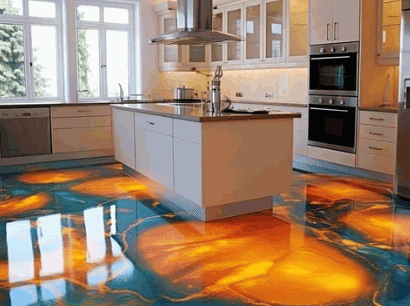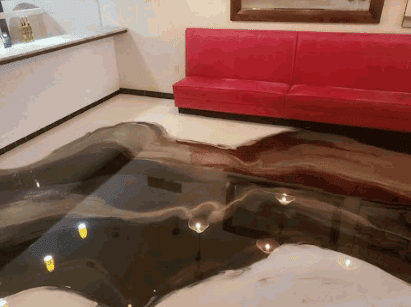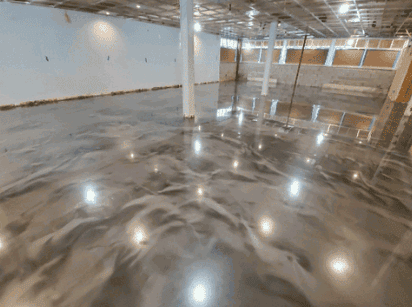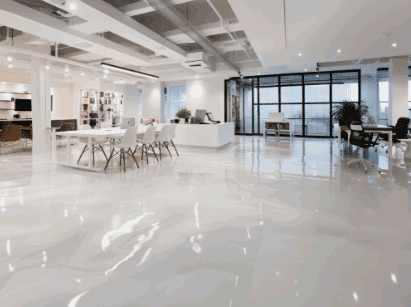
Resin flooring is a popular choice for a variety of spaces due to its durability, chemical resistance, and easy maintenance. From industrial to residential settings, resin flooring offers a range of benefits including aesthetics and longevity.
In this article, we will explore the different types of resin flooring, its applications, installation process, and factors to consider before choosing the right type for your space. Whether you are looking for a sleek and modern flooring solution or a durable option for high-traffic areas, resin flooring may be the perfect choice for you.

Table of Contents
Resin flooring, also known as epoxy or polyurethane flooring, is a seamless and highly durable flooring solution commonly used in industrial, commercial, and residential settings.
Its durability is one of its primary advantages, as resin flooring is highly resistant to heavy foot traffic and various chemicals, making it ideal for spaces that require a tough and long-lasting flooring solution. The seamless nature of resin flooring not only enhances its durability but also makes it easy to maintain, as there are no grout lines where dirt and grime can accumulate.
The installation process for resin flooring involves applying multiple layers of resin to create a strong, smooth, and attractive finish, offering endless design possibilities for creating personalized and aesthetically pleasing spaces.

Resin flooring encompasses various types such as epoxy, polyurethane, and decorative options, each tailored for specific environments and aesthetic preferences.
Epoxy resin flooring, known for its high durability, is a popular choice for industrial settings due to its resistance to chemicals and heavy foot traffic. On the other hand, polyurethane resin flooring offers a more flexible and UV-resistant solution, making it ideal for outdoor applications. Decorative resin flooring, with endless customization possibilities, adds a touch of creativity to commercial spaces, such as restaurants and retail stores, enhancing the overall ambiance. The versatility of resinous flooring systems lies in their ability to combine durability, aesthetics, and customization tailored to diverse needs.
Check out: Can Epoxy Flooring Be Used On Wood
Resin flooring offers a multitude of benefits, including exceptional durability, chemical resistance, easy maintenance, and enhanced aesthetic appeal.
These characteristics make resin flooring an ideal choice for various settings, such as industrial facilities, commercial spaces, healthcare facilities, and even residential areas. The durability of resin flooring ensures that it can withstand heavy foot traffic, impacts, and wear, making it a long-lasting solution that can maintain its quality over time. Its chemical resistance properties protect against spills and stains, making it suitable for areas prone to frequent exposure to harsh substances. The easy maintenance requirements of resin flooring make it a practical and cost-effective choice for busy environments, where regular cleaning is essential to uphold hygiene standards.
One of the key benefits of resin flooring is its exceptional durability, providing long-lasting performance due to its seamless application and robust composition.
Resin flooring stands out for its ability to withstand heavy foot traffic, impact, and chemical exposure, making it ideal for high-traffic areas like commercial spaces and industrial facilities. Its wear resistance ensures that it maintains its quality and appearance over time, reducing the need for frequent repairs or replacements. The structural integrity of resin flooring adds to its longevity, offering a reliable solution for environments that require a durable and low-maintenance flooring option.
Resin flooring is renowned for its exceptional chemical resistance, making it an ideal choice for industrial settings where exposure to harsh chemicals is common.
The chemical-resistant properties of resin flooring stem from its composition, usually comprising epoxy, polyurethane, or methyl methacrylate resins. These materials create a seamless, impermeable surface that can withstand corrosive substances, oils, acids, and solvents commonly found in industrial environments. This durability not only protects the substrate beneath the flooring but also ensures a safe and clean environment for workers. Given its ability to resist chemical spills and stains, resin flooring is often preferred for areas such as manufacturing plants, laboratories, warehouses, and processing facilities where liquid resin applications are prevalent.
Maintaining resin flooring is a breeze, thanks to its easy-to-clean surface, making it a preferred choice for commercial spaces that require regular upkeep.
This type of flooring offers several maintenance advantages that benefit busy commercial environments. To keep resin flooring in top condition, regular sweeping and mopping with a mild detergent solution is usually all that's required. For tougher stains or scuff marks, a gentle scrub with a soft-bristled brush can easily remove them. Applying a sealant every few years helps prolong the lifespan of the flooring and maintains its shine. These simple upkeep practices not only keep the flooring looking sleek but also contribute to its long-term durability, making it a cost-effective choice for businesses.
Beyond its practical benefits, resin flooring offers a wide range of aesthetic options, including decorative finishes and customizable designs that enhance the visual appeal of any space.
Resin floors can be customized to mimic various materials such as marble, wood, or even metallic surfaces, giving the flexibility to create unique and luxurious looks. The decorative possibilities are endless, from incorporating patterns, logos, and intricate designs to playing with colors and textures. Whether you prefer a sleek and modern finish or a more artistic and expressive look, resin flooring allows for the seamless integration of various styles to match the ambiance and theme of your space.

Resin flooring finds extensive applications across industrial, commercial, and residential sectors, offering versatile solutions for diverse spaces and environments.
In industrial settings, resin flooring proves to be a durable and chemical-resistant option, ideal for factories, warehouses, and manufacturing plants where heavy machinery and high foot traffic are prevalent.
For commercial establishments such as retail stores, restaurants, and offices, resin floors offer an aesthetic appeal with various design options, while being easy to maintain and clean, making them a practical choice for busy spaces.
In residential spaces like kitchens, bathrooms, and basements, resin flooring provides a seamless, waterproof surface that withstands daily wear and tear, offering a modern and functional flooring solution.
In industrial settings, resin flooring serves as a high-performance solution, delivering durability, chemical resistance, and long-lasting performance in demanding environments.
This type of flooring is specifically designed to withstand the heavy machinery and equipment commonly used in industrial facilities, making it an ideal choice for areas with high traffic and potential impact. Its seamless surface not only provides a sleek appearance but also prevents the accumulation of dirt and debris, promoting a cleaner and safer work environment.
Resin flooring is known for its resistance to a wide range of chemicals, acids, and solvents, ensuring that it can maintain its integrity even in the face of harsh industrial substances.

Commercial spaces benefit greatly from resin flooring due to its seamless application, sustainable features, and aesthetic appeal that create a welcoming and professional environment.
This type of flooring is particularly well-suited for various commercial settings such as retail stores, restaurants, and office buildings where durability and aesthetics are essential. The seamless installation of resin flooring ensures a smooth surface without any grout lines or seams, making it easy to clean and maintain. Its sustainable attributes, including low VOC emissions and recyclability, align well with businesses looking to reduce their environmental impact.
The diverse range of colors and finishes available in resin flooring allows businesses to customize the look of their space to reflect their brand identity and create a visually appealing ambiance for customers and employees.

Resin Flooring offers innovative solutions for residential spaces, providing customizable designs, modern aesthetics, and a durable flooring solution that enhances the overall appeal of homes.
These versatile flooring options are not only visually appealing but also highly practical for everyday living. With resin flooring, homeowners can choose from a wide range of colors, textures, and patterns to perfectly complement their interior décor.
The seamless nature of resin flooring eliminates grout lines, making it easy to clean and maintain, ideal for busy households. Its durability ensures that it can withstand heavy foot traffic, spills, and general wear and tear, making it a long-lasting investment for any home.
The smooth surface of resin flooring provides a sleek, contemporary look that can elevate the style of any room.

The installation of resin flooring involves several key steps, including surface preparation, primer application, resin coating, and topcoat finishing to ensure a seamless and durable floor surface.
Surface preparation is a critical initial step in resin flooring installation, involving thorough cleaning, repair, and priming to ensure proper adhesion and long-term performance of the floor coating. Without adequate surface preparation, even the most advanced resin systems will fail to deliver their full potential.
Cleaning the surface removes any contaminants that could interfere with the bonding of the resin to the substrate. Repairing cracks and imperfections ensures a smooth and even base for the coating to adhere to, preventing future issues. Priming further enhances the bond between the substrate and the topcoat finish, creating a strong foundation for a durable and aesthetically pleasing resin floor.
Investing time and effort in surface preparation pays off in the form of a resilient and long-lasting flooring solution.
The application of a primer is essential in resin flooring projects to enhance adhesion, promote uniformity, and prepare the surface for the subsequent resin coating and topcoat finish.
By acting as a bonding agent between the substrate and the resin, the primer helps promote strong adhesion, which is crucial for the longevity and durability of the flooring system. Primers also play a vital role in sealing porous surfaces, preventing issues such as outgassing and bubbling that can occur if the resin is directly applied to untreated substrates.
This step not only ensures a smoother finish but also aids in the overall aesthetics and performance of the topcoat, resulting in a professional and long-lasting resin flooring installation.
The application of resin coatings is a pivotal stage in resin flooring installation, where liquid resins are applied and spread evenly to create a seamless and protective layer over the prepared substrate.
During the liquid resin application process, the installers carefully pour the resin over the surface, ensuring consistent coverage. To achieve a level finish, specialized tools such as leveling rakes or squeegees are used to spread the resin evenly. This helps in eliminating any air bubbles or uneven patches. Once the resin is spread uniformly, the seamless finish is achieved by allowing it to self-level. This self-leveling property of the resin contributes to a smooth and flawless topcoat finish, enhancing both the aesthetic and functional aspects of the resin flooring.
The final step in resin flooring installation involves applying a topcoat finish, which seals the resin layers, enhances durability, and provides a seamless and polished appearance to the flooring surface.
This protective topcoat layer acts as a shield against wear and tear, extending the lifespan of the flooring. It also ensures that the underlying resin layers are securely sealed, preventing any exposure to external elements that could compromise their integrity.
The application of a topcoat is crucial in achieving a uniform and flawless finish, eliminating any imperfections or rough textures on the surface. This final touch not only adds a layer of protection but also enhances the overall aesthetic appeal of the resin flooring, making it visually appealing and easier to maintain.
Before selecting resin flooring, it is crucial to consider factors such as traffic levels, chemical exposure risks, aesthetic preferences, and budget constraints to ensure the ideal flooring solution for your specific needs.
Traffic requirements play a significant role in determining the type of resin flooring best suited for your space. High-traffic areas, such as commercial kitchens or manufacturing facilities, necessitate durable options like epoxy coatings or polyurethane systems.
For spaces prone to chemical exposure, such as laboratories or warehouses, it is imperative to choose a resin flooring system that offers resistance to acids, solvents, and other harsh substances.
Aesthetic considerations involve choosing from a wide range of colors, finishes, and textures to complement your design scheme while meeting functional requirements. Aligning your aesthetic preferences with your budget constraints will help narrow down the choices to find the most cost-effective yet visually appealing resin flooring solution.
Understanding the expected traffic and usage patterns is essential when selecting resin flooring, particularly in industrial and commercial settings where heavy footfall and equipment movement dictate the flooring requirements.
Choosing the right resin flooring system can significantly impact the overall performance and longevity of a space, ensuring it can withstand the continuous demands placed upon it. The durability and wear resistance of resin flooring plays a crucial role in maintaining a safe and functional environment, especially in areas prone to heavy traffic. The ability of resin floors to withstand chemical exposure and high impact makes them a popular choice for industrial facilities where stringent hygiene and safety standards are paramount.
For environments with chemical exposure risks, opting for chemical-resistant resin flooring is critical to ensure long-term performance and protection against corrosive substances that may compromise standard flooring materials.
Choosing the right chemical-resistant resin flooring involves considering protective coatings that create a barrier against harmful chemicals. Liquid resin applications offer seamless coverage, reducing the risk of penetration and damage to the substrate. Specialized formulations further enhance the flooring's ability to withstand chemical exposure, ensuring durability and longevity in demanding industrial settings.
By prioritizing chemical resistance in resin flooring selection, businesses can safeguard their infrastructure, maintain operational efficiency, and minimize the need for costly repairs or replacements due to chemical degradation.
Aesthetics play a significant role in resin flooring choices, with decorative options and aesthetic appeal influencing the overall look and feel of the space where the flooring will be installed.
When considering resin flooring, one must carefully evaluate the customization features that can lend a unique touch to the design scheme of a room. From color variations to patterns and textures, the possibilities for personalization are seemingly endless. These decorative elements offer a chance to infuse character and style into any space, whether it's a residential area or a commercial establishment. The aesthetic preferences of individuals or businesses are often reflected in the flooring material chosen, making the selection process a crucial aspect of interior design.
Balancing budget constraints with the desire for quality flooring solutions is essential when choosing resin flooring, as options range from cost-effective choices to customizable high-end finishes based on financial considerations.
Understanding the impact of budget considerations on resin flooring selection can lead to informed decision-making that aligns with both financial parameters and aesthetic preferences. Cost-effective options like epoxy coatings or polyurethane finishes provide durability and functionality at a lower cost, ideal for those looking to stay within budget constraints.
Alternatively, for those seeking a more customized flooring solution, decorative quartz or metallic epoxy overlays offer a luxurious finish that can be tailored to specific design requirements, although they may come at a higher price point.
By evaluating cost-effective and customizable flooring options, individuals can find the perfect balance between budget limitations and achieving their desired flooring aesthetic.